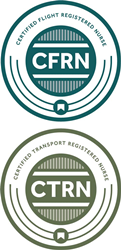
RNs who pass BCEN’s rigorous CFRN and CTRN national certification exams have demonstrated their mastery of flight nursing and critical care ground transport nursing.
“Flight and ground transport nurses deliver crucial and often life-preserving or life-saving care to critically ill or injured patients in health care’s most austere, autonomous and high stakes environments, and this most recent study underscores the unique aspects of each mode of transport.”
OAK BROOK, Ill. (PRWEB)
August 31, 2021
The latest transport nursing role delineation study (RDS) conducted by the Board of Certification for Emergency Nursing (BCEN) and its examination development partner PSI Services LLC underlines the unique aspects of the flight and critical care ground transport nursing specialties — and was used to develop, for the first time, separate exam content outlines for BCEN’s Certified Flight Registered Nurse (CFRN) and Certified Transport Registered Nurse (CTRN) certification programs.
As of today, the updated CFRN exam form and new passing score, based on the December 2019 RDS, goes into effect. The updated CTRN exam form and passing score will go into effect in February 2022. While the CFRN and CTRN programs have always had separate exams, there was a shared exam content outline.
Professional credentials are a means to ensure clinical competency and professionalism and thus are a measure of nursing excellence. A role delineation study (also known as a job or practice analysis) helps credentialing bodies ensure their exams are based on current practice. Exam content outlines describe the specialty body of knowledge and scope of practice and serve as an essential study guide for exam takers.
“Flight and ground transport nurses deliver crucial and often life-preserving or life-saving care to critically ill or injured patients in health care’s most austere, autonomous and high stakes environments, and this most recent study underscores the unique aspects of each mode of transport,” said BCEN CEO Janie Schumaker, MBA, BSN, RN, CEN, CENP, CPHQ, FABC.
“Because BCEN’s emergency nursing credentials validate specialty expertise to nurses and their colleagues and employers, and because board certification inspires the confidence of patients and their families, BCEN is committed to ensuring that all of our credentials remain current and of the highest quality,” added Schumaker.
There are nearly 5,000 CFRNs and 350 CTRNs, with the CTRN program experiencing higher-than-average growth over the past several years. Introduced in 1993, the CFRN is a preferred national certification for flight team nurses, meets Commission on Accreditation of Medical Transport Systems (CAMTS) requirements, and is an accredited and Magnet-accepted certification. The CTRN, introduced in 2006, likewise is a preferred certification for ground transport nurses, meets CAMTS requirements and is Magnet-accepted.
“While there is expected overlap in the clinical areas of the CFRN and CTRN, there are unique and increasingly significant differences between what ground and air transport nurses need to know regarding patient physiology, scene operations, and safety, as well as differences related to patient conditions and the length of transport,” said BCEN Director of Certification and Accreditation Amy Grand, MSN, RN.
The updated CFRN exam outline, published earlier this year, includes the following domains: General Principles of Flight Transport Nursing Practice (which includes Transport Physiology, Scene Operations Management, Communications, Safety and Survival, Disaster Management and Professional Issues) as well as Resuscitation Principles, Trauma, Medical Emergencies, and Special Populations. The first, separate CTRN exam content outline will be published in early September.
For more on flight and ground transport nursing history and specialty certification, read the recently published Excellence in the Air: The CFRN and Grounded in Excellence: The CTRN.
About BCEN
Founded in 1980, the independent, not-for-profit Board of Certification for Emergency Nursing (BCEN®) offers robust national board certification programs fostering empowered nurses across the emergency spectrum who contribute noticeably to patient care, safety and outcomes. Nearly 59,000 BCEN credentials are currently held by registered nurses (RNs) who specialize in emergency, flight, critical care ground transport, pediatric emergency and trauma nursing. BCEN offers the Certified Emergency Nurse (CEN®), Certified Flight Registered Nurse (CFRN®), Certified Pediatric Emergency Nurse (CPEN®), Certified Transport Registered Nurse (CTRN®) and Trauma Certified Registered Nurse (TCRN®) certifications. The CEN, CFRN, CPEN, and TCRN certification programs are accredited by the Accreditation Board for Specialty Nursing Certification (ABSNC). Learn more at bcen.org. Follow BCEN on Facebook, LinkedIn and Instagram.
Share article on social media or email:

